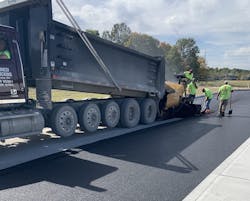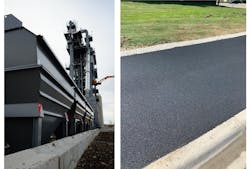As the son of a former construction company owner, Ryan Smith has been in the business his whole life. One of his first tasks while working for his father as an adult was to procure and install a new asphalt plant. After acquiring an asphalt plant with recycling capabilities, they quickly saw how valuable it was.
“We bought this plant in 2007 at the height of the Great Recession,” explained Smith. “[Because of the recession] there became a dramatic shift in the scope of work we were completing, building less of new infrastructure and reconstructing more of what’s already built.”
A common byproduct of reconstruction projects is recycled asphalt product, or RAP. RAP is often recycled into new asphalt mixes, which can prevent the material from sitting unused or filling up landfills. Smith and his father instantly realized the opportunity RAP could create for the business and industry; however, their new plant was able to recycle only about 12 to 13% on average. Managing the RAP they were collecting also presented a challenge, because they were accumulating more than what the plant was capable of processing. Smith saw that using RAP directly correlated with increased margins, creating a cost savings that could be passed on to the customer. There was significant potential for increasing the amount of recycled content put into the mixes they were producing.
Today, Smith is now the founder and CEO of RAP Management, a Sustainable Pavement Materials Manufacturer based in Columbus, Ohio. The company produces asphalt mixes that can use up to 70% RAP, a far increase from the current industry average of about 20% recycled content. Smith said the company’s rapid growth and success are due to the precisely manufactured, superior quality pavement materials they provide to the market. “We consistently hear from our customers that the pavement is easy to install, looks great and performs with durability,” said Smith. This quality can be attributed to their proprietary mix designs as well as their equipment partners and suppliers.
In Search of a Solution
Smith spent several years researching the potential for higher percentages of recycled material in asphalt mixes. With many infrastructure projects gearing toward the rehabilitation of existing roadways rather than new construction — and the resulting reclaimed pavement stockpiling in facilities — Smith sought to reduce the waste while at the same time develop a competent quality product to compete in the marketplace.
The initial obstacle was finding technology that could allow for much higher recycled content to be used in asphalt mixes. Smith met with Ammann Group, a mechanical engineering company based in Switzerland that had already developed asphalt plants that could process larger amounts of RAP while creating high-quality and precisely engineered product that could out-perform virgin asphalt in most cases. With much older infrastructure, European companies were using RAP at much higher quantities than in the U.S. “I realized that they had perfected this high-recycle concept and that the technology existed. Now it comes down to finding the right partner that could help me properly rejuvenate the mixes,” said Smith.
A Proven Partner
Eventually Smith partnered with Cargill Bioindustrial to properly rejuvenate the bitumen and binder from reclaimed asphalt. RAP Management incorporates Cargill’s ANOVA® rejuvenator solution, which has been used successfully in pavement projects using up to 100% RAP into its asphalt mix designs to great success.
“We actually sold more asphalt in our first year of business than what I projected we would do in year five,” Smith said. “That correlates directly to Cargill’s chemistry and just the nature of our business model in general. And the reason we’re selling so much asphalt is because of quality.”
When asked what made Cargill Bioindustrial a fit for what RAP Management was aiming to do, Smith said it was the experience and testing that were proven. “They [Cargill] have the most tons of asphalt in the world installed with [their] chemistry. And they have the best testing status showing that their chemistry actually performs,” he said. “Our customers are telling us we’re making the best material they have ever installed.”
The Cargill asphalt team works with customers long after the product is purchased to make sure specs and overall quality are achieved. “The customer service I get from the Cargill team adds so much value to my business,” said Smith. “They are in it for the long haul with every project and really stand by the product, the science and overall process to ensure we deliver a top-shelf RAP solution.”
On average, RAP Management is running more than 55% recycled content in the asphalt mixes they produce, which is three times the industry average. And after experiencing rapid growth selling to the commercial paving market, RAP Management is looking to expand. The company is slated to do a demonstration project with the city of Columbus that is an opportunity to highlight the capabilities of its facilities, the value of the product’s chemistry and “the ability for us, in a sustainable fashion, to produce really high-performing asphalt paving material.”
As infrastructure continues to age and contractors seek better quality product for U.S. roadways, more efficient uses of by products like RAP should naturally increase. A large part of RAP Management’s mission is ultimately lowering the environmental footprint of infrastructure. “The purpose behind this business is to divert this large amount of waste that’s being accumulated every year in the U.S. as we reconstruct roads,” Smith said. “Together, with our communities, we are paving Ohio’s future.”
To view the case study pdf, click here.

